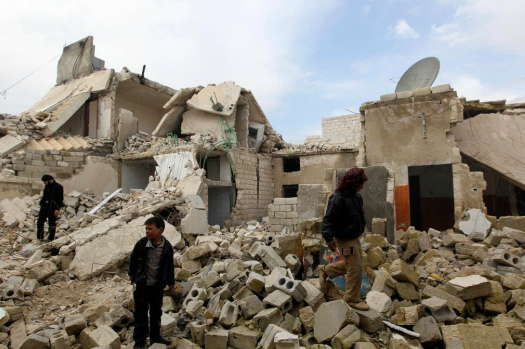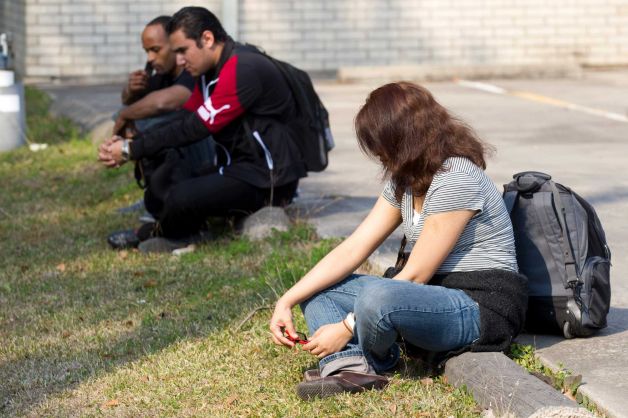One of the basic ideas that I bring to this blog is that a lot can be learned from photographs that are not striking, dramatic, or otherwise visually assertive. Of course, most of the time I’m still working with high-grade professional images, but the distinction holds all the more for that.
Few photography instructors would advise their students to take a distant, poorly lit shot of people walking aimlessly across a pile of rubble. But they might need to think otherwise if they were preparing those students for a tour of duty in a war zone. This is an all-too-typical scene from Aleppo. The electronics remaining along the roof line suggest this had been a high-tech building, but now it’s been bombed back to the stone age.
Instead of downloading, people are scavenging. Not for food (not here and not yet at least) but more for something to do. And that is what the photo reveals: not just destruction, but how much war is about killing time. Soldiers know all too well how bursts of activity can be separated by long stretches of boredom, but that is nothing compared to what many civilians experience. War imprisons them–whether in their homes or a refugee camp–while destroying virtually all work, schooling, or play. As the built environment around them is degraded more and more every week, their opportunity to do anything productive becomes ever more constricted and difficult. Time looms large as something to be filled–with what?–but in fact that time is being lost. Lost to them and to the rest of society. Time that could be used to do so much: to learn, work, entertain, invent, and not least to actually live and not merely survive. . . .
Look at the photo again and consider how you can see what I’m talking about. Not just the destruction of the building, with all the hardship that will cause, but also how time is actually present in the photograph, expanding to fill the craters and exposed buildings, spreading across the rubble that now blocks any attempt to do anything in that place. Look at how helpless those in the picture are to beat back the emptiness. Even the playfulness evident in the figure on the right will soon be exhausted, and more time will be lost to the bewilderment and hopelessness evident in the other boy and the adult to the left. Their time will be like the space in the photo: there is too much of it, now that it can no longer be productively organized by the buildings and routines of ordinary life.
So you might ask, Is that just one photo, or can we see the same thing elsewhere? My guess is that you can find the same problem wherever there is persistent violence. In the US, for example.
These students at Lone Star College are killing time as their campus is being locked down following a gunfight. Apparently two guys were carrying, and so we now all are witnesses to an example of NRA-style conflict resolution. Of course, it didn’t exactly play out the way it was supposed to. Instead of two rugged individualists settling their differences with frontier justice, someone else was caught in the crossfire and thousands of students and staff at several institutions in the area had their day seriously disrupted. (Has anyone measured the collateral damage in lost time and productivity from all these shootings?) But the details here are not the point.
No, the point is that this, too, is an image of war. The circumstances differ in many ways, of course, and so the definition is being stretched too far, but consider how one effect may be the same in both countries. Shooting in both Syria and Texas is not only destroying people and property, it also is killing time. Killing it by making it useless and a burden to be borne rather than a precious resource to be used and enjoyed.
If the NRA had its way, every college and university would be required to allow people to carry concealed weapons on campus. Welcome to the war zone.
Photographs by Muzaffar Salman/Reuters and Brett Coomer, Houston Chronicle.


Discussion